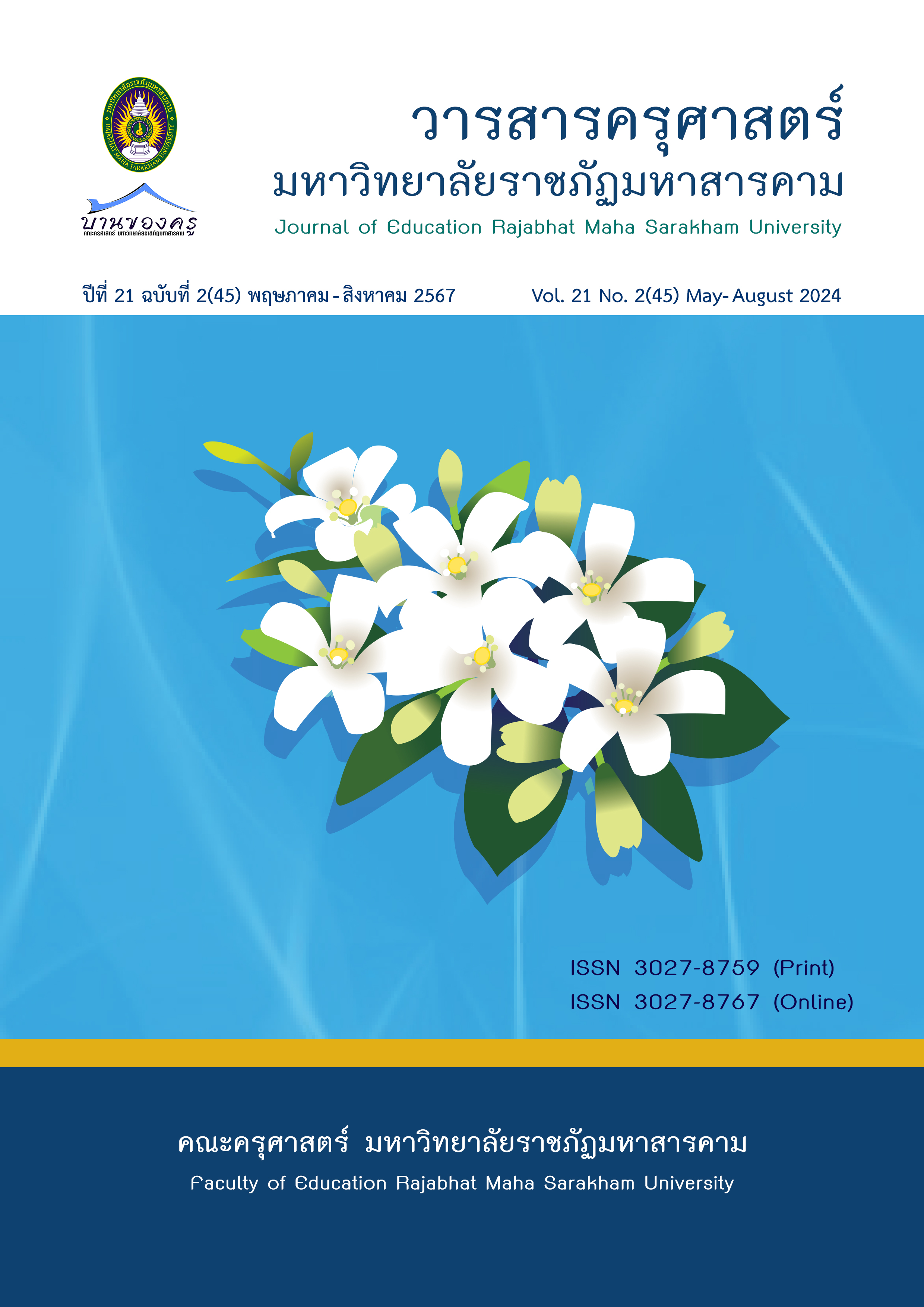การศึกษาความสัมพันธ์ระหว่างการคิดทางคณิตศาสตร์ และความวิตกกังวลทางคณิตศาสตร์ของนักเรียนชั้นมัธยมศึกษาปีที่ 2
Main Article Content
บทคัดย่อ
การวิจัยครั้งนี้มีวัตถุประสงค์เพื่อ 1) ศึกษาการคิดทางคณิตศาสตร์ของนักเรียน เรื่อง โจทย์ปัญหาเกี่ยวกับสมการกำลังสองตัวแปรเดียว 2) ศึกษาความวิตกกังวลทางคณิตศาสตร์ของนักเรียน 3) เปรียบเทียบความวิตกกังวลทางคณิตศาสตร์ระหว่างนักเรียน ห้องเรียนพิเศษ และห้องเรียนปกติ 4) ศึกษาความสัมพันธ์ระหว่างการคิดทางคณิตศาสตร์ และความวิตกกังวลทางคณิตศาสตร์ กลุ่มตัวอย่างที่ใช้ในการวิจัยครั้งนี้ ได้แก่ นักเรียนชั้นมัธยมศึกษาปีที่ 2 โรงเรียนโกสุมวิทยาสรรค์ จังหวัดมหาสารคาม ภาคเรียนที่ 2/2565 จำนวน 220 คน เครื่องมือที่ใช้ในการวิจัยครั้งนี้ ได้แก่ แบบทดสอบการคิดทางคณิตศาสตร์ และแบบวัดความวิตกกังวลทางคณิตศาสตร์ สถิติที่ใช้ในการวิจัย ได้แก่ ร้อยละ ค่าเฉลี่ย ส่วนเบี่ยงเบนมาตรฐาน ค่าสหสัมพันธ์ และการวิเคราะห์การถดถอยอย่างง่าย
ผลการวิจัยพบว่า 1) การคิดทางคณิตศาสตร์ของนักเรียนส่วนใหญ่อยู่ในระดับปานกลาง มีจำนวน 121 คน คิดเป็นร้อยละ 55.00 2) ความวิตกกังวลทางคณิตศาสตร์ของนักเรียนเมื่อนำไปเทียบกับเกณฑ์อยู่ในระดับสูง 3) คะแนนเฉลี่ยความวิตกกังวลทางคณิตศาสตร์ ของนักเรียนห้องเรียนพิเศษสูงกว่านักเรียนห้องเรียนปกติ อย่างมีนัยสำคัญทางสถิติที่ระดับ .05 4) การคิดทางคณิตศาสตร์มีความสัมพันธ์กับความวิตกกังวลทางคณิตศาสตร์อย่างมีนัยสำคัญ .05 โดยมีค่าสัมประสิทธิ์สหสัมพันธ์เท่ากับ .726 แสดงว่าตัวแปรอิสระมีความสัมพันธ์กันสูงกับความวิตกกังวลทางคณิตศาสตร์
Article Details

อนุญาตภายใต้เงื่อนไข Creative Commons Attribution-NonCommercial-NoDerivatives 4.0 International License.
ข้อกำหนดเบื้องต้นที่ผู้นิพนธ์(ผู้ส่งบทความ) ควรทราบ
1. ผู้นิพนธ์ที่ประสงค์จะลงตีพิมพ์บทความกับวารสาร ตั้งแต่เดือนมกราคม 2563 เป็นต้นไป ให้ใช้รูปแบบใหม่ (Template 2563) โดยสามารถดูตัวอย่างได้ที่เมนู GUIDELINES
2. จะตีพิมพ์และเผยแพร่ได้ ต้องผ่านการประเมินจากผู้ทรงคุณวุฒิ (Peer Review)
3. การประเมินบทความโดยผู้ทรงคุณวุฒิ (Peer Review) เป็นแบบ Double Blind
4. การอ้างอิงบทความใช้หลักเกณฑ์ APA (American Psychological Association) คลิก
5. บทความถูกปฏิเสธการตีพิมพ์ ไม่ผ่านการประเมิน ผู้นิพนธ์ขอยกเลิกเองหรือชำระเงินก่อนได้รับการอนุมัติ ทางวารสารไม่มีนโยบายการคืนเงิน
เอกสารอ้างอิง
จิรายุส สมานมิตร. (2555). การศึกษาปัจจัยบางประการที่ส่งผลต่อความสามารถในการแก้โจทย์ปัญหาทางคณิตศาสตร์ของนักเรียนชั้นมัธยมศึกษาปีที่ 3 สังกัดสำนักงานเขตพื้นที่การศึกษาประถมศึกษานครปฐม เขต 1 [วิทยานิพนธ์ปริญญามหาบัณฑิต]. มหาวิทยาลัยศรีนครินทรวิโรฒ.
ณัฐณิชา เถาว์โท. (2563). การเปรียบเทียบการแก้ปัญหาทางคณิตศาสตร์ของนักเรียนชั้นมัธยมศึกษาปีที่ 1 ที่มีความวิตกกังวลทางคณิตศาสตร์และการรับรู้ความสามารถของตนเองที่แตกต่างกัน [วิทยานิพนธ์ปริญญามหาบัณฑิต]. มหาวิทยาลัยราชภัฏมหาสารคาม. https://fulltext.rmu.ac.th/fulltext/2563/M128715/Thaoto%20Nutnicha.pdf
นวพล นนทภา. (2559). การคิดทางคณิตศาสตร์. มหาวิทยาลัยราชภัฏมหาสารคาม.
ยุพิน พิพิธกุล. (2554). การพัฒนาแบบทดสอบวัดความสามารถในการสื่อสาร สื่อความหมายทางคณิตศาสตร์และการนำเสนอสำหรับนักเรียนชั้นประถมศึกษาปีที่ 6 [วิทยานิพนธ์ปริญญามหาบัณฑิต]. มหาวิทยาลัยทักษิณ.
วนิดา เขตประทุม. (2563). การศึกษาการคิดทางคณิตศาสตร์ของนักเรียนชั้นมัธยมศึกษาปีที่ 2 [วิทยานิพนธ์ปริญญามหาบัณฑิต]. มหาวิทยาลัยราชภัฏมหาสารคาม. https://fulltext.rmu.ac.th/fulltext/2563/M129761/Ketptatum%20Wania.pdf
วิจารณ์ พานิช. (2555). วิถีสร้างการเรียนรู้เพื่อศิษย์ในศตวรรษที่ 21. มูลนิธิสดศรีสฤษดิ์วงศ์.
Anderson, L. W. & Bourke, S. F. (2000). Assesing affective characteristics in the schools. (2nd ed). London: Lawrence Erlbaum Associates.
Benjamin J. Sinwell. (2017). Formative Assessment Strategies for Mathemetical Thinking: A Qualitative Action Research Study. University of South Carolina.
Hanna Viitala. (2018). Studying pupils’ mathematical thinking through problem solving and view of mathematics-Case studies of Finnish comprehensive school pupils. Lulea University of Technology.
John Gino Bosica. (2020). Using a Mixed Methods Approach to Study the Relationship Between Mathematics Anxiety, Mathematics Teacher Efficacy, and Mathematics Teaching Anxiety in Preservice Elementary School Teachers in Ontario. Canada: Queen’s University.
Kelly Houston. (2020). The Flipped Classroom's Impact on Math Anxiety, Self-Efficacy, and Motivation at the Middle School Level. Cabrini University ProQuest Dissertations & Theses.
Lea Damisch. (2021). An Investigation of the Relationship Between Math Anxiety and Self-Effacy Among Practicing Elementary Teachers. Aurora University ProQuest Dissertations & Theses.
Tami Hocker. (2017). A STUDY OF PERCEPTIONS OF MATH MINDSET, MATH ANXIETY, AND VIEW OF MATH BY YOUNG ADULTS. USA: Southeastern University.


